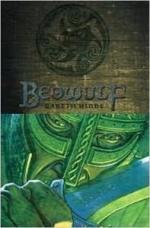{Beowulf’s dying request.}
Bade
that remembering the deeds of your friend-lord
40 Ye build
on the fire-hill of corpses a lofty
Burial-barrow,
broad and far-famous,
As
’mid world-dwelling warriors he was widely most
honored
While
he reveled in riches. Let us rouse us and hasten
[105] Again to see and seek for the treasure,
45 The wonder
’neath wall. The way I will show you,
That
close ye may look at ring-gems sufficient
And
gold in abundance. Let the bier with promptness
Fully
be fashioned, when forth we shall come,
And
lift we our lord, then, where long he shall tarry,
50 Well-beloved
warrior, ’neath the Wielder’s protection.”
{Wiglaf charges them to build a funeral-pyre.}
Then
the son of Wihstan bade orders be given,
Mood-valiant
man, to many of heroes,
Holders
of homesteads, that they hither from far,
[6]Leaders
of liegemen, should look for the good one
55 With
wood for his pyre: “The flame shall now
swallow
(The
wan fire shall wax[7]) the warriors’ leader
Who
the rain of the iron often abided,
When,
sturdily hurled, the storm of the arrows
Leapt
o’er linden-wall, the lance rendered service,
60 Furnished
with feathers followed the arrow.”
Now
the wise-mooded son of Wihstan did summon
The
best of the braves from the band of the ruler
{He takes seven thanes, and enters the den.}
Seven
together; ’neath the enemy’s roof he
Went
with the seven; one of the heroes
65 Who fared
at the front, a fire-blazing torch-light
Bare
in his hand. No lot then decided
Who
that hoard should havoc, when hero-earls saw it
Lying
in the cavern uncared-for entirely,
Rusting
to ruin: they rued then but little
70 That
they hastily hence hauled out the treasure,
{They push the dragon over the wall.}
The
dear-valued jewels; the dragon eke pushed they,
The
worm o’er the wall, let the wave-currents take
him,
[106] The waters enwind the ward of the treasures.
{The hoard is laid on a wain.}
There
wounden gold on a wain was uploaded,
75 A mass
unmeasured, the men-leader off then,
The
hero hoary, to Whale’s-Ness was carried.
[1] For ‘gehydde,’
B. suggests ‘gehyethde’: the passage
would stand as
above except the change of
‘hidden’ (v. 2) to ‘plundered.’
The
reference, however, would
be to the thief, not to the dragon.




